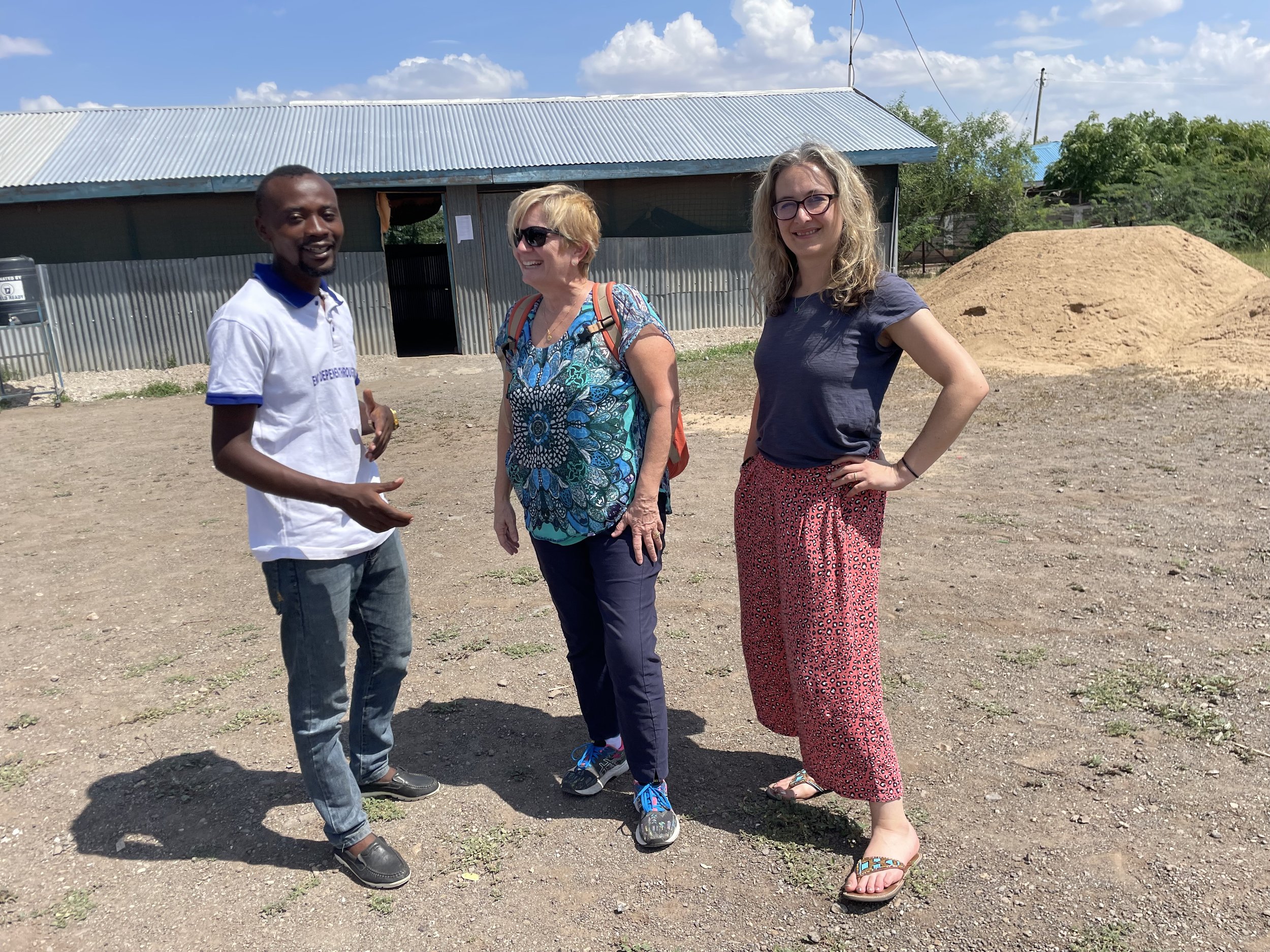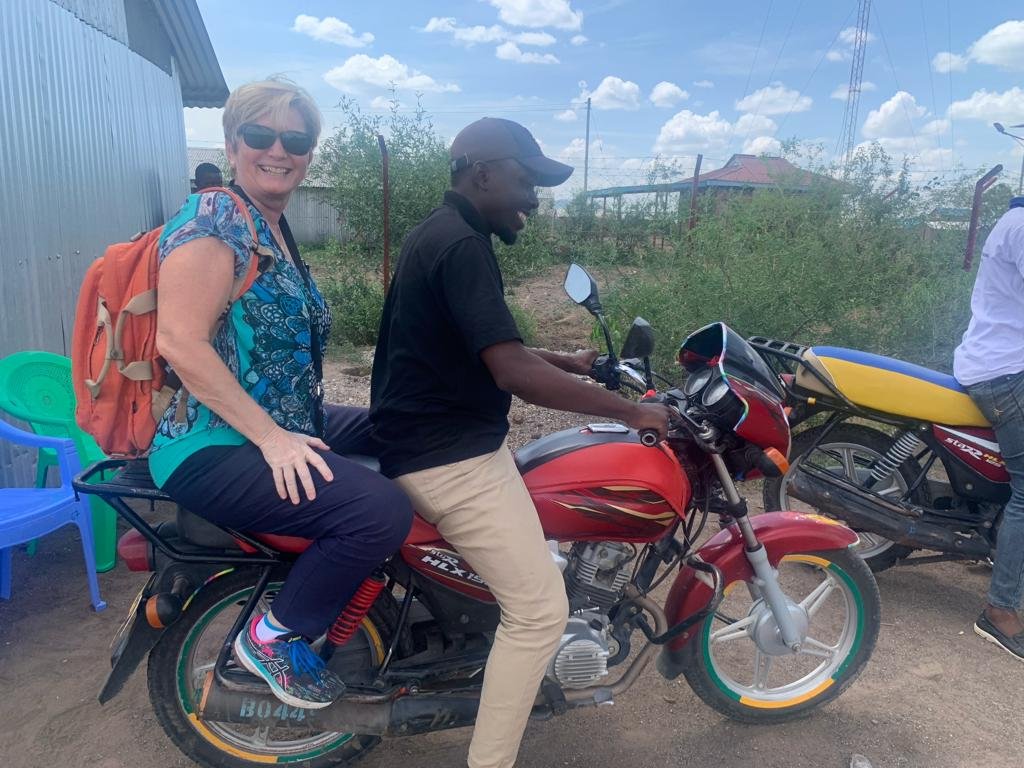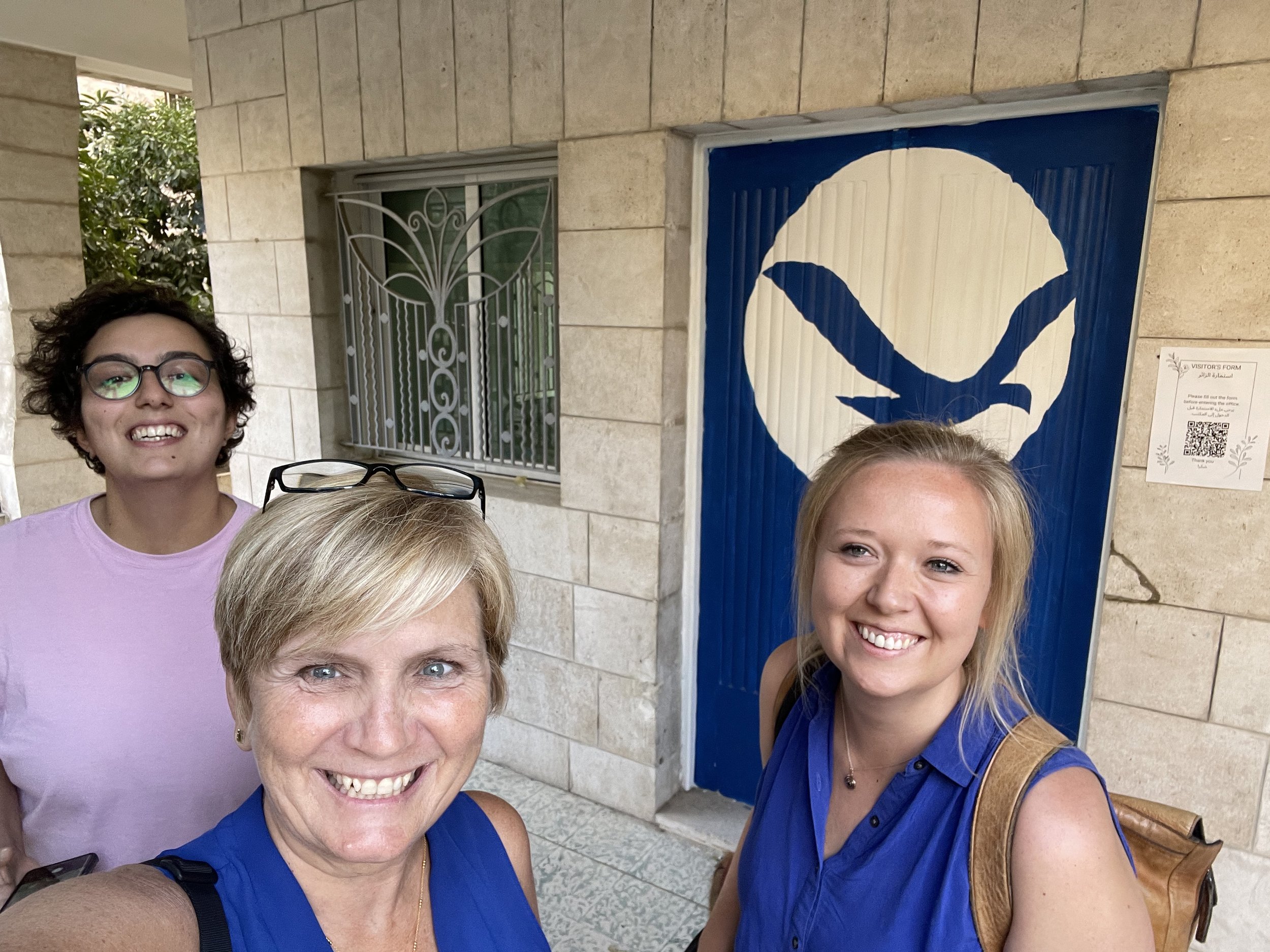Meet Lizzie Bray, Amala’s new Director of Education Programmes and former head of UWCSEA
We are delighted to announce that senior educational leader Lizzie Bray has been appointed as Amala’s Director of Education Programmes. Lizzie is the former Head of the renowned international school, United World College of South East Asia (UWCSEA - Dover), Amala’s founding partner school which played a pivotal role in supporting the development of the curriculum for the Amala Global Secondary Diploma programme.
Lizzie has been working with the Amala team as a consultant since September 2022, collaborating closely with our team to build capacity within the organisation to achieve accreditation. Since then she has been working on a project to ensure that we are able to continue to deliver on the promise of our transformative education whilst reaching greater numbers of students.
Lizzie joins Amala at an exciting time: having received accredited status from the Council of International Schools (CIS) and the New England Association of Schools and Colleges (NEASC), we are currently looking to the next three years of Amala’s development. The coming years will focus on creating more impact through the expansion of our programmes, as well as through sharing Amala’s transformative education model more widely. The role of Director of Education Programmes will be critical as we grow and scale our work. With over 30 years of experience, Lizzie’s extensive background in teaching and leadership in international schools across the globe and deep understanding of what a world class education looks like will be invaluable on this journey.
Lizzie spoke to us about her background and path to Amala, being a self-professed “curriculum geek”, values led work, and how Amala is making a difference.
Amala: Lizzie - congratulations on your new role! What was it that drew you to Amala initially?
Lizzie: My connection to Amala goes back to 2016 when colleagues from UWCSEA returned from the UWC Congress in Trieste, Italy, excited about having met [Amala Co-founders and Co Executive Directors] Polly and Mia, and said to me, “Lizzie, you really need to meet these two women, they're doing this fantastic work and they're trying to write a curriculum and you talk their language”. Needless to say Polly and Mia’s vision for refugee education left a strong impression.
Jump ahead six years and my husband and I have moved back to Canada after living overseas for more than 30 years. Apart from learning how to be Canadian again, my professional priority was to seek projects that were purposeful and aspiring to make a difference in the world. When the chance to support Amala with their accreditation process emerged as a possibility, it was so clear to me that this was something I wanted to be a part of. My heartfelt belief in the power of education and the opportunity to use my experience alongside so many others on the Amala teams felt too good to be true.
Over the past 18 months, I have learned that Polly and Mia are like magnets: they’ve brought together global and local teams from within urban and rural refugee communities. There’s such a deep underlying strength and passion to make a difference in the humans that we work with which is quite beautiful and truly inspirational.
Can you tell us a bit more about your background and how you got into the education world?
My father often said that I didn't seek a career in education; education found me! He was not surprised at all with my career path. I grew up in Montreal, Canada, and I loved studying science and math. My father was a neurologist, so I thought about going into medicine; I considered being a geologist; I thought about chemistry, marine sciences; these were just some of the avenues that I explored.
When I graduated from McGill University with my Bachelor of Science, I grabbed my backpack and started to explore the world by finding work along the way. My first job was teaching English as a second language to adults in Japan. Turns out I loved teaching, so my next stop was back to Canada to complete my teaching certification at Simon Fraser University in Vancouver. After a few years teaching in Canada it was time to return overseas. I was able to combine an MSc from Oregon State University with teaching and leadership roles in the Dominican Republic, Bahrain, and Singapore. It's been an amazing journey filled with incredible people who have inspired me and helped to shape my understanding of ‘the power of education’.
As much as I loved facilitating and supporting student learning in the classroom or science lab, my inner ‘curriculum geek’ always found new challenges designing curriculum for students across all disciplines. Curriculum geek is an odd but recognisable term by others with similar interests in education (Director of Education Programmes sounds much better). As UWCSEA grew, I was in the right place at the right time to move between different curriculum leadership roles. When I started at UWCSEA there was a single campus of around 1600 students. More than twenty years later when I said farewell to Singapore and UWCSEA, I was the Head of Dover campus’s 3000 students working in collaboration with the Head of East and their 3000 students.
What makes a good curriculum?
It starts with your purpose. Mission and guiding statements are incredibly important because this is essentially the promise or commitment that we make to our students. Amala’s emphasis on student agency through what I would describe as ‘contextualised lifeworthy learning’ permeates the learning goals and the model for assessment. There is no disconnect between what we aspire for and with our students and the curriculum. You have to be mindful that this remains true, which means bringing students into the curriculum development process.
The art and science of teaching, learning and wellbeing is to be able to bring this high level thinking into what is actually happening in your classroom. If you don't contextualise and make it real for students, then schools are just buildings with humans in them that are getting their learning some place else.
I think we learnt through Covid something that is essential about education systems: humans need meaningful opportunities to interact with each other. We've learned how to do it better on digital platforms, but nothing replaces informal conversations. And that happens with young people when you bring them together. You're more successful when the project or the learning compels them and they want to be there. The days of thinking that a student is an empty vessel and you pour knowledge into them are thankfully long gone.
What are the similarities and differences between Amala’s educational model and other education environments that you’ve come from? What can they learn from each other?
I think there are very few experts in education, whether you look to the OECD or into a classroom somewhere in the middle of rural Canada, who would not describe traditional education as being stuck. It’s a model that is sometimes referred to as ‘20th century learning’.
Schools were created to put children in a safe place, to get them out of industries and away from manual labour and to let them learn. But the nature of learning, how we learn and where we can learn has changed so much. For example, I bought this fancy coffee maker which broke, and I couldn’t figure out how to fix it. My 15 year old son went to YouTube. He made some choices , decided on one he thought was suitable for his mother to understand, and said, “Mom, this is it.” Access to this kind of learning is everywhere. So it doesn’t make sense to replicate it in your classroom. We need to design learning that connects with and is of value to students. If they’re sitting there thinking that they could learn this elsewhere and they have so many options available from YouTube to Google to Chat GPT, then what’s the point? We need to ask how we bring young people together and add value to their lives. A lot of schools have tried to shift away from that traditional model, but it is the volume of content in the 20th century kind of curriculum and learning that has been hard to get rid of. You really do have to get a spade and dig stuff up and throw it out. That has been challenging on both national levels and local levels. It doesn't matter where you go, private schools, public schools - so many have found this hard to do.
The advantage that Amala has, and the choices that Amala made with the curriculum, sit firmly in the 21st century. From the beginning, Amala had something that was different. Competency based content, where content isn’t the be all and end all. Content is important, but at Amala it is contextualised and it is about making a difference. Students understand why they’re learning what they’re learning. The approach that Polly and Mia and those who were involved in creating the curriculum, in particular Stuart MacAlpine, UWCSEA’s Director of Teaching and Learning, took in those early days of creating those learning modules jumped over where traditional schools are stuck. They didn't even engage with it. They just skipped it. And that was a very good thing. Because now other schools can look at Amala's programme and think about the fastest route they can take to get to that.
It’s a more engaging and transformative type of education. The parameters that we're working within are clear. We are working with students who have not completed their secondary education. There’s a gap. Through no fault of their own, they're displaced, some have refugee status, some have not, but for one reason or another cannot access the route to complete traditional secondary education.
Amala’s curriculum is brave and exciting. Amala has created something that builds agency, and helps students gain an understanding of how to tackle problems in their community. The learning that they engage with over 15 months really builds that sense of agency, the skills and the knowledge to go out and make a difference. Amala students really are inspirational. Their resilience, their resourcefulness, everything that you see in our students inspire me to work harder on their behalf.
You join Amala as we are drawing to the close of our three year strategic plan, A Launchpad to Scale, and prepare for the next stage of Amala’s growth. What roles do educational development and quality assurance play in delivering Amala programmes at scale?
I think they go hand in hand. We have to stick to the mantra of quality and scale, not quality or scale. We have to do everything in our power to maintain that quality. You want to be able to have that cycle of renewal, but maintain and sustain the quality. It wouldn’t be fair to those amazing talented youth for Amala to grow so quickly that we’re not able to give them a great education. It’s a marathon, not a sprint. The same is true for the development of Amala educators. For example, at Amala we work with educators who have had varying levels of training in education but importantly they have direct lived experience within the refugee community. With targeted and supportive professional development, they grow into their professional roles. My suspicion is that over time our educators will get poached! Others will want them. If someone has learned how to be an Amala educator and they move to another organisation or create their own organisation, they will use all those skills that they learned at Amala. So your impact might be once removed, but it's still an impact. They leave with their learning. In terms of educational development, this is a really exciting place to be putting our energy. It’s good to remember a thought shared with me by one of our partners from Kalobeyei Initiative for Better Life (KI4BLI), Samuel Binja. He speaks so clearly about how, when moving across borders, the only thing that traveled with him was his education.
What has influenced you most in your career and your approach to work?
The overriding thing that has influenced my life has been the values that were instilled in me and demonstrated to me by my parents and my grandparents. Three values that stick with me most are integrity, curiosity, and compassion: understanding right from wrong, always wanting to be curious about what's going on in the world, and actually caring about what's going on in the world and where you could make a difference.
What are you most looking forward to in your new role as Director of Education Programmes here at Amala?
There are a few things. The first is the people that I'm going to get to work with. Facilitators, coordinators, partners, Polly, Mia, the students - the people you work with matter. I have really enjoyed the work that I've done with Amala so far. So I’m excited about being able to collaborate on a daily basis with those people on a variety of new projects.
The second is a bit trickier to explain. It's about being part of an organisation that believes that the work that we're doing has the potential to cause systems to change. That’s important to me. Amala doesn't see a refugee. They see a student who happens to be a refugee. And so we contextualise our learning for those circumstances. It matters hugely that our facilitators are from the communities where we work because that brings all of the context that you want for your students. There’s something about that - about being part of an organisation that could possibly change mindsets about what it means to be a refugee or the circumstances that have brought you to that place.
Then there’s the impact of the human connection. When Amala alumni talk to other people and demonstrate that they are doing amazing things, you can really see that youth have so much potential. The world simply cannot afford to ‘lose’ these young peoples’ talents and ideas.
Finally, there's changing the narrative. I want to be part of debunking the stories that see an immigrant or refugee population as some kind of a threat when I can only see individuals with the strength and resilience to be a force for good - wherever they live.
You can follow Lizzie on Linkedin.
This is the fourth in our ‘Meet the Amala Team’ series. You can read spotlights on other members of the Amala Team here.





